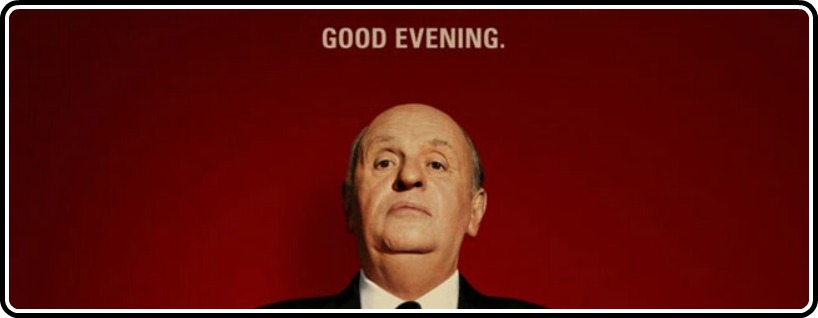2012 will be remembered for many things. An election year, it will also be remembered as the year that saw the completion of one of the biggest blockbuster franchises in the form of The Dark Knight Rises and the start of a new universe with The Avengers. But no single entity has had a better 2012 than the master of suspense himself, Alfred Hitchcock.
As the BFI restores a handful of films from the filmmaker and his film, Vertigo, sits atop the list of the greatest film ever made, his time while making his beloved thriller, Psycho, has now been immortalized by a new dramatic biopic. Entitled Hitchcock, it’s just too bad that it can’t live up to the potential brought to the project by its cast and subject matter.
Directed by first time narrative feature filmmaker Sacha Gervasi (Anvil! The Story Of Anvil), Hitchcock tells the story of both Hitch’s time making Psycho, as well as his collaboration, both in film and in life, with his wife Alma Reville. We meet Hitch (Anthony Hopkins), as he’s known to friends and loved ones, coming off the success of films like North By Northwest, and with studios breathing down his neck to make another picture just like that, he and Alma decide to go it alone and fund this passion project for the master of suspense.
Based on Stephen Rebello’s book Alfred Hitchcock And The Making Of Psycho, the film’s greatest flaw comes in its screenplay and narrative structure. Penned by John J. McLaughlin, the film is surprising standard in its structure, but narratively plays like an extended and glorified Saturday Night Live skit. Finding our lead as nothing more than a gifted auteur with a penchant for getting a little too close to his bombshell blondes, the film interjects dream sequences seeing Hitch speak to the inspiration for his pending film, Ed Gein. It is in these moments that the film completely looses all momentum, detracting from a truly moving story of an auteur and his relationship with a woman who is seemingly his wife, but is even more so a collaborator in life and work. These flights of fancy are ill-advised at best and ultimately turn the film into a bit of experimentation that completely falls flat.
However, the cast does ultimately raise the material, at least the best to their abilities. Anthony Hopkins is solid as Hitchcock, but the real star of the film here is Helen Mirren. Taking on the role of Alma Reville, she gives the role such a distinct sense of truth and imbues Alma with a strength that is palpable. The wife of Hitch, she is asked to do quite a lot of the film’s heavy lifting, particularly emotionally, as it is their relationship that is the most intriguing and emotionally resonant aspect of this film’s narrative. Scarlett Johansson steals a few scenes here as Janet Leigh, as does Toni Collette as Peggy Robertson and Michael Stuhlbarg as the film’s producer, Lew Wasserman. A subplot involving Danny Huston’s Whitfield Cook is limp wristed and detracts from what is an otherwise semi-compelling story, with Hitch’s B story, involving his past relationship with Vera Miles (played solidly by Jessica Biel) gives an insight into one of Hitch’s big failures. Overall, the script doesn’t offer much for these thespians to take over, but the room they are allowed to work within does bring out some of their best work, particularly from a consistently great Mirren. Too bad the same can’t be said for Gervasi as a director.
Coming from the world of non-fiction filmmaking, Gervasi is a tad out of place here, never giving the film enough life or vitality to make any sort of impact. The dream sequences are best described as silly and out of place here, and the moments of true drama (save for the expertly made shower sequence) come off as melodramatic and clichéd. Jeff Cronenweth’s photography is muted and almost lifeless, again something that does no justice to how vibrantly shot the director at the center of this biopic would shoot his films, and Danny Elfman’s score is oddly inert, something unfathomable for the whimsical composer.
Overall, as an actor’s showcase, this film is solid. Hopkins and Mirren are solid, as are much of the supporting cast. However, with a first time fiction filmmaker behind the camera and a haphazard screenplay, Hitchcock never gets out of the starting gate. A comatose look at the creation of one of the greatest thrillers of all time, this film is one of the more forgettable films from a year that has seen a resurgence of appreciation for the career of the man himself.




![Bergman Island (The Criterion Collection) [Blu-ray]](https://criterioncast.com/wp-content/uploads/2022/11/bergman-island-the-criterion-collection-blu-ray-400x496.jpg)
![This Is Not a Burial, It’s a Resurrection (The Criterion Collection) [Blu-ray]](https://criterioncast.com/wp-content/uploads/2022/11/this-is-not-a-burial-its-a-resurrection-the-criterion-collection-blu-ray-400x496.jpg)
![Lars von Trier's Europe Trilogy (The Criterion Collection) [The Element of Crime/Epidemic/Europa] [Blu-ray]](https://criterioncast.com/wp-content/uploads/2022/11/lars-von-triers-europe-trilogy-the-criterion-collection-the-element-of-400x496.jpg)
![Imitation of Life (The Criterion Collection) [Blu-ray]](https://criterioncast.com/wp-content/uploads/2022/11/imitation-of-life-the-criterion-collection-blu-ray-400x496.jpg)
![The Adventures of Baron Munchausen (The Criterion Collection) [4K UHD]](https://criterioncast.com/wp-content/uploads/2022/11/the-adventures-of-baron-munchausen-the-criterion-collection-4k-uhd-400x496.jpg)
![Cooley High [Criterion Collection] [Blu-ray] [1975]](https://criterioncast.com/wp-content/uploads/2022/11/cooley-high-criterion-collection-blu-ray-1975-400x496.jpg)